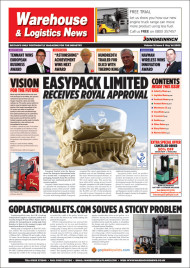VIEW THIS ‘DIGITAL EDITION’ NOW
SIGN UP TO THE REMINDER SERVICE
Welcome to the 1 May Warehouse & Logistics News. In our Forklift Trucks feature, you can read how the UK’s major forklift vendors are tailoring their offering to these trying times. As our feature reveals, in the present economic climate, quality used forklift trucks are increasingly in demand in the British market. Whatever age, forklifts must be regularly inspected and certified as safe to use. They need proper servicing, which the major players and their distributors are well placed to provide.
As the sun comes out, so have Tesco’s latest record figures. It’s encouraging to know our leading retailer is doing so well, not just here but globally. Tesco’s domestic and overseas supply chains employ large numbers of warehousing and logistics professionals. If you see your glass half full rather than half empty, you’re probably thinking like us that maybe Tesco’s continuing prosperity is a sign that we’re through the worst of the recession. It’s a warming thought.
In complimenting Tesco and, let’s be fair, the other supermarkets, we should also recognise the invaluable contribution of their W&L operations and the 3PL logistics providers.
We should also acknowledge that these operations reached their present size and level of excellence, thanks in part to sustained innovation from a shoal of suppliers across a spectrum of technologies. We’re talking about such key areas as warehouse management systems, data capture and materials handling, including forklift trucks, conveyors and racking.
Even in a recession we can’t do without these technologies, and the retailers and their suppliers continue to invest in them. Many leading vendors of this equipment are multi-national, but a significant number of those supplying retailers’ UK operations are British-based, and need investment to come out with fresh innovation.
This column was written just before Chancellor Alistair Darling announced his 2009 Budget, so we can’t comment on what’s in it to revive British industry. Whether it is launched in this Budget or introduced later, what is hopeful is that Gordon Brown himself is said to be considering setting up a new bank to invest in start-up and high-risk business ventures, and put money into industry and innovation.
Commentators think the new bank could well resemble the Industrial and Commercial Finance Corporation, set up in 1945 to invest in post-war growth industries, including materials handling and related industries. The ICFC was a public-private partnership between the Bank of England and Britain’s big clearing banks. ICFC became ‘3i’ in the eighties and was privatised in the ’90s, but we need something like it now.
Have a successful month.
Warehouse & Logistics News





Comments are closed.